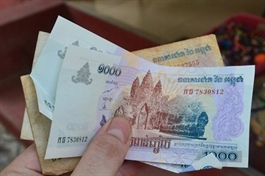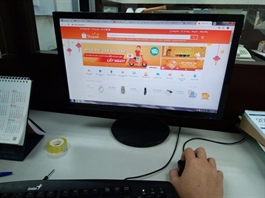Averting the consequences of slowing flows in capital
Averting the consequences of slowing flows in capital
Low credit demand might be an early indicator that bad debt will increase. Nguyen Thi Phuong, deputy general director of Agribank, talked to VIR’s Nhue Man about the issue in the domestic market.
Banks’ financial statements for the first quarter of the year showed that mobilisation is mostly higher than the loan balance. What is your opinion on this?
It is undeniable that the system has had concerns about liquidity in certain periods, leading to credit institutions focusing more on safety and stability than meeting people’s liquidity needs. Besides this, the need to mobilise government bonds of the state treasury decreased sharply, while investor confidence in corporate bonds has not yet been restored, so a large amount of money is being deposited in the banking system.
One of the main reasons for the abundant liquidity was also evident in the financial statements of the first quarter of 2023. Demand for loans is currently falling very sharply. The interest rate for capital mobilisation is decreasing, but the commercial banking system, even if it wanted to, cannot decrease too sharply and quickly because the interest rate depends on other factors of the macroeconomy and the relationship between the exchange rate and the interest rates in other currencies.
In May, deposit interest rates tended to fall sharply by 0.5-1 per cent per year. The decline was recorded in most terms in the banking system, especially after the State Bank of Vietnam (SBV) decision to reduce the operating interest rate in May.
To keep the money market stable, commercial banks should not wait for the management agency to lower the interest rate to lower their own interest rate, especially state-owned commercial banks which are responsible for leading the commercial banking sector. Therefore, since the beginning of the year, banks have actively reduced lending rates, but credit has not increased as expected for a number of reasons.
Firstly, the demand for capital for investment and business expansion is reduced. In fact, production enterprises face difficulties with output, causing the demand for loans to decrease. Small- and medium-sized enterprises are in a weak financial situation, and therefore fail to meet the requirements of banks for loans. In the real estate sector, demand has decreased as many projects faced legal issues.
Secondly, data from the Ministry of Industry and Trade showed that the import and export turnover in the first five months of 2023 continues to fall deeply, with a double-digit decrease compared to the same period last year, down more than 11 per cent). The decrease in imports was larger, reflecting the continued difficult production situation, so demand for imported raw materials decreased.
Thirdly, public investment spending is slow. According to the report of the Ministry of Finance, the estimated disbursement rate in the first four months of 2023 reached 14.66 per cent of the plan. Compared with the plan assigned by the prime minister, the disbursement rate reached 15.65 per cent, lower than the same period in 2022 when it was 18.48 per cent.
The banking system’s growth is mainly based on credit. Now that capital flows are slowing, will this have consequences?
The issue that most concerns bank leaders today is that low credit growth will lead to many consequences. In which, there are difficulties in implementing the objectives of the restructuring project associated with dealing with bad debts - it’s difficult to keep the bad debt ratio at a low level.
Banks are still gradually bringing down lending interest rates. However, the cash flow in production and business between enterprises is congested, leading to a chain effect that causes businesses to not have the cash flow to repay each other. Credit institutions, of course, are a part of this debt story.
A circular issued by the SBV in April stipulates that credit institutions and foreign bank branches can restructure their repayment terms and keep the debt group unchanged to support troubled customers. Will this be helpful?
It is an immediate solution, creating conditions for banks to restructure debts to help borrowers to restore production and access capital and repay loans. It clearly states that, if the specific provision amount to be added is positive, credit institutions and foreign bank branches shall make additional provision by December 31 of at least 50 per cent.
As of the end of 2024, the remaining amount will be deducted to reach 100 per cent of the specific provision amount to be additionally deducted. But the problem is whether the financial capacity of credit institutions is enough to make deductions.
In addition, not calculating accrued interest during debt restructuring is also a great pressure of the banking industry.
Around this issue, interest rates are currently decreasing, but the accumulated deposit interest rates in the previous 10 months are still maintained, so on average, input interest rates are high while credit growth is the lowest in many years.
What action has Agribank taken in response to these developments?
Agribank since April has directed and guided units to restructure debt repayment periods to support customers who have difficulties in production and customers who have difficulty repaying loans. The rescheduling of debt repayment terms for customers is carried out from April 24 to the end of June next year.
Agribank also issued forceful solutions to recover bad debts, minimising risk in 2023. In normal times, the solution is to continue to reduce costs, make provisions and maintain credit quality. But now credit growth is low and bad debt increases, which is a difficult for the economy to solve, rather than just a credit quality issue. The most feasible solution is to try to bring down interest rates faster to reduce input costs.




















